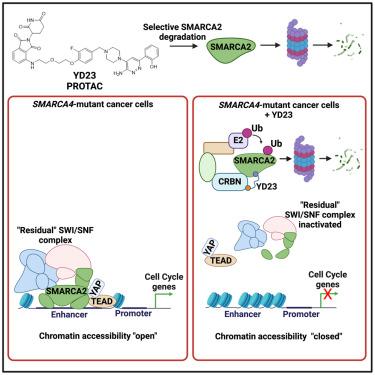当前位置:
X-MOL 学术
›
Cell Chem. Bio.
›
论文详情
Our official English website, www.x-mol.net, welcomes your
feedback! (Note: you will need to create a separate account there.)
Enhancer reprogramming underlies therapeutic utility of a SMARCA2 degrader in SMARCA4 mutant cancer
Cell Chemical Biology ( IF 6.6 ) Pub Date : 2024-10-07 , DOI: 10.1016/j.chembiol.2024.09.004 Sasikumar Kotagiri, Nicholas Blazanin, Yuanxin Xi, Yanyan Han, Md Qudratullah, Xiaobing Liang, Yawen Wang, Poonam Pandey, Hira Mazhar, Truong Nguyen Lam, Anand Kamal Singh, Jing Wang, Yonathan Lissanu
Cell Chemical Biology ( IF 6.6 ) Pub Date : 2024-10-07 , DOI: 10.1016/j.chembiol.2024.09.004 Sasikumar Kotagiri, Nicholas Blazanin, Yuanxin Xi, Yanyan Han, Md Qudratullah, Xiaobing Liang, Yawen Wang, Poonam Pandey, Hira Mazhar, Truong Nguyen Lam, Anand Kamal Singh, Jing Wang, Yonathan Lissanu

|
Genomic studies have identified frequent mutations in subunits of the SWI/SNF (switch/sucrose non-fermenting) chromatin remodeling complex including SMARCA4 and ARID1A in non-small cell lung cancer (NSCLC). Genetic evidence indicates that the paralog SMARCA2 is synthetic lethal to SMARCA4 suggesting SMARCA2 is a valuable therapeutic target. However, the discovery of selective inhibitors of SMARCA2 has been challenging. Here, we utilized structure-activity relationship (SAR) studies to develop YD23, a potent and selective proteolysis targeting chimera (PROTAC) targeting SMARCA2. Mechanistically, we show that SMARCA2 degradation induces reprogramming of the enhancer landscape in SMARCA4-mutant cells with loss of chromatin accessibility at enhancers of genes involved in cell proliferation. Furthermore, we identified YAP/TEADas key partners to SMARCA2 in driving growth of SMARCA4-mutant cells. Finally, we show that YD23 has potent tumor growth inhibitory activity in SMARCA4-mutant xenografts. These findings provide the mechanistic basis for development of SMARCA2 degraders as synthetic lethal therapeutics against SMARCA4-mutant lung cancers.
中文翻译:

增强子重编程是 SMARCA2 降解剂在 SMARCA4 突变癌症中的治疗效用的基础
基因组研究发现,非小细胞肺癌 (NSCLC) 中 SWI/SNF(开关/蔗糖非发酵)染色质重塑复合物亚基(包括 SMARCA4 和 ARID1A)亚基发生频繁突变。遗传证据表明,旁系同源物SMARCA2对 SMARCA4 是合成致死的,这表明 SMARCA2 是一个有价值的治疗靶点。然而,选择性 SMARCA2 抑制剂的发现一直具有挑战性。在这里,我们利用构效关系 (SAR) 研究开发了 YD23,这是一种靶向 SMARCA2的有效选择性蛋白水解靶向嵌合体 (PROTAC)。从机制上讲,我们表明SMARCA2降解诱导SMARCA4突变细胞中增强子景观的重编程,而参与细胞增殖的基因增强子的染色质可及性丧失。此外,我们确定 YAP/TEAD 是SMARCA2驱动 SMARCA4 突变细胞生长的关键合作伙伴。最后,我们表明 YD23 在 SMARCA4 突变异种移植物中具有有效的肿瘤生长抑制活性。这些发现为开发 SMARCA2 降解剂作为针对 SMARCA4 突变肺癌的合成致死疗法提供了机制基础。
更新日期:2024-10-07
中文翻译:

增强子重编程是 SMARCA2 降解剂在 SMARCA4 突变癌症中的治疗效用的基础
基因组研究发现,非小细胞肺癌 (NSCLC) 中 SWI/SNF(开关/蔗糖非发酵)染色质重塑复合物亚基(包括 SMARCA4 和 ARID1A)亚基发生频繁突变。遗传证据表明,旁系同源物SMARCA2对 SMARCA4 是合成致死的,这表明 SMARCA2 是一个有价值的治疗靶点。然而,选择性 SMARCA2 抑制剂的发现一直具有挑战性。在这里,我们利用构效关系 (SAR) 研究开发了 YD23,这是一种靶向 SMARCA2的有效选择性蛋白水解靶向嵌合体 (PROTAC)。从机制上讲,我们表明SMARCA2降解诱导SMARCA4突变细胞中增强子景观的重编程,而参与细胞增殖的基因增强子的染色质可及性丧失。此外,我们确定 YAP/TEAD 是SMARCA2驱动 SMARCA4 突变细胞生长的关键合作伙伴。最后,我们表明 YD23 在 SMARCA4 突变异种移植物中具有有效的肿瘤生长抑制活性。这些发现为开发 SMARCA2 降解剂作为针对 SMARCA4 突变肺癌的合成致死疗法提供了机制基础。




















































 京公网安备 11010802027423号
京公网安备 11010802027423号